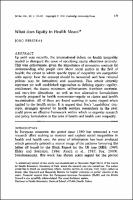| dc.description.abstract | Up until very recently, the international debate on health inequality tended to disregard the issue of specifying equity objectives precisely. This was unfortunate, given the importance of normative analysis for understanding why people care about social justice in the field of health; the extent to which specific types of inequality are compatible with equity; how the concept should be measured; and how rational policies may be formulated and monitored. This article critically appraises six well established approaches to defining equity—egality, entitlement, the decent minimum, utilitarianism, Rawlsian maximin, and envy-free allocations—as well as two alternative formulations recently proposed by health economists—equity as choice and health maximisation. All of these are found wanting in some respect when applied to the health sector. It is argued that Sen's 'capabilities' concepts, strangely ignored by health services researchers in the past, could prove an effective framework within which to organise research and policy formulation in the area of health and health care inequality. | |

